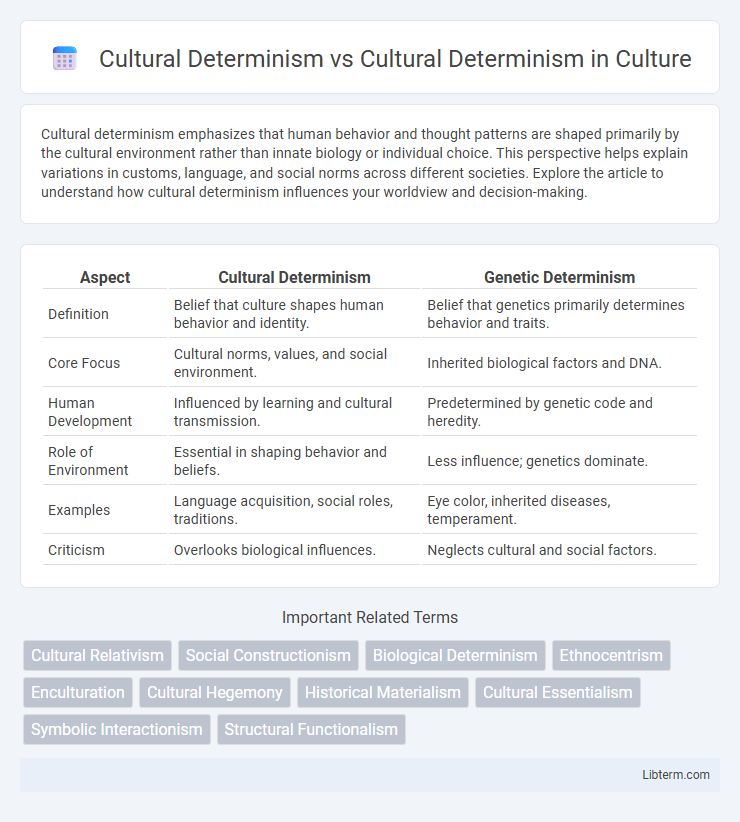Cultural determinism emphasizes that human behavior and thought patterns are shaped primarily by the cultural environment rather than innate biology or individual choice. This perspective helps explain variations in customs, language, and social norms across different societies. Explore the article to understand how cultural determinism influences your worldview and decision-making.
Table of Comparison
| Aspect | Cultural Determinism | Genetic Determinism |
|---|---|---|
| Definition | Belief that culture shapes human behavior and identity. | Belief that genetics primarily determines behavior and traits. |
| Core Focus | Cultural norms, values, and social environment. | Inherited biological factors and DNA. |
| Human Development | Influenced by learning and cultural transmission. | Predetermined by genetic code and heredity. |
| Role of Environment | Essential in shaping behavior and beliefs. | Less influence; genetics dominate. |
| Examples | Language acquisition, social roles, traditions. | Eye color, inherited diseases, temperament. |
| Criticism | Overlooks biological influences. | Neglects cultural and social factors. |
Understanding Cultural Determinism
Cultural determinism emphasizes the extent to which cultural values, beliefs, and practices shape individual behavior and societal development, asserting that culture is the primary factor influencing human actions. Understanding cultural determinism involves analyzing how language, traditions, and social norms govern cognitive processes and decision-making within different communities. This perspective contrasts with biological determinism by highlighting environmental and social influences over genetic or innate predispositions in shaping human identity and societal outcomes.
Historical Evolution of Cultural Determinism
The historical evolution of Cultural Determinism traces its roots to early 20th-century anthropology, where scholars emphasized culture as the primary force shaping human behavior and societal development. Influential figures like Franz Boas challenged biological determinism by arguing that cultural environments, not genetics, determine individual and group differences. Over time, this perspective evolved to encompass complex interactions between cultural norms, historical contexts, and social structures, reinforcing culture's pivotal role in human identity formation.
Key Theories in Cultural Determinism
Cultural determinism emphasizes the role of culture in shaping human behavior, suggesting that cultural values, norms, and socialization processes fundamentally determine individual identity and social outcomes. Key theories include Clifford Geertz's interpretive approach, which views culture as a system of shared symbols and meanings, and Edward Sapir's linguistic relativity hypothesis, highlighting how language influences thought and perception within a cultural context. These theories contrast with biological determinism by attributing human development and societal organization primarily to cultural rather than genetic factors.
Influential Thinkers in Cultural Determinism
Cultural determinism, championed by thinkers such as Edward Sapir and Benjamin Lee Whorf, emphasizes the role of language and culture in shaping human cognition and behavior, positing that cultural frameworks fundamentally determine individual thought processes. Franz Boas contributed significantly by advocating for cultural relativism, challenging biological determinism and promoting the understanding of cultures on their own terms. These influential scholars collectively shaped the discourse on how culture profoundly impacts perception, communication, and identity within societies.
Cultural Determinism’s Role in Shaping Societies
Cultural determinism asserts that societal values, beliefs, and customs fundamentally shape human behavior and social institutions, influencing everything from law to education systems. This theory highlights how culture dictates individuals' perceptions and actions, reinforcing social norms and guiding economic and political structures. By emphasizing the power of culture over biology or environment, cultural determinism explains the diverse developmental paths and social realities across different societies.
Critiques and Limitations of Cultural Determinism
Cultural determinism faces critiques for oversimplifying human behavior by attributing actions solely to cultural influences, neglecting biological and individual factors. Its limitations include potential cultural essentialism, which risks stereotyping and ignoring intra-cultural diversity. Scholars argue that this perspective underestimates the dynamic interplay between culture, individual agency, and external socio-economic conditions.
Cultural Determinism vs. Biological Determinism
Cultural determinism emphasizes the influence of societal norms, values, and learned behaviors in shaping human actions, contrasting sharply with biological determinism, which attributes behavior primarily to genetic and physiological factors. Studies in anthropology and sociology reveal that cultural contexts profoundly impact identity formation, social roles, and decision-making processes, often overriding biological predispositions. The debate highlights the extent to which environment and nurture can modify or even negate innate biological influences on human behavior.
Modern Perspectives on Cultural Determinism
Modern perspectives on cultural determinism emphasize the dynamic interplay between culture and individual agency, challenging the notion that culture rigidly dictates behavior. Recent studies highlight how globalization, technological advances, and cross-cultural interactions reshape cultural norms and identities, allowing for greater fluidity and hybridization. These approaches recognize culture as both a constraining and enabling force, influencing but not entirely determining human actions.
Real-World Applications of Cultural Determinism
Cultural determinism emphasizes how cultural values and social norms shape individual behavior and societal development, influencing areas such as education, business practices, and international relations. In education, curricula tailored to cultural backgrounds improve engagement and learning outcomes by reflecting students' lived experiences. Businesses adopting culturally informed strategies enhance global market success by aligning marketing and management approaches with local customs and consumer behavior patterns.
Future Directions of Cultural Determinism Debate
Future directions of the cultural determinism debate emphasize integrating interdisciplinary perspectives from anthropology, sociology, and cognitive science to better understand how culture shapes human behavior and societal development. Emerging research explores the dynamic interaction between cultural determinants and technological advancements, highlighting the evolving influence of digital culture on identity and values. Scholars increasingly advocate for empirical studies that quantify cultural impact while considering globalization's role in cultural convergence and divergence.
Cultural Determinism Infographic

 libterm.com
libterm.com